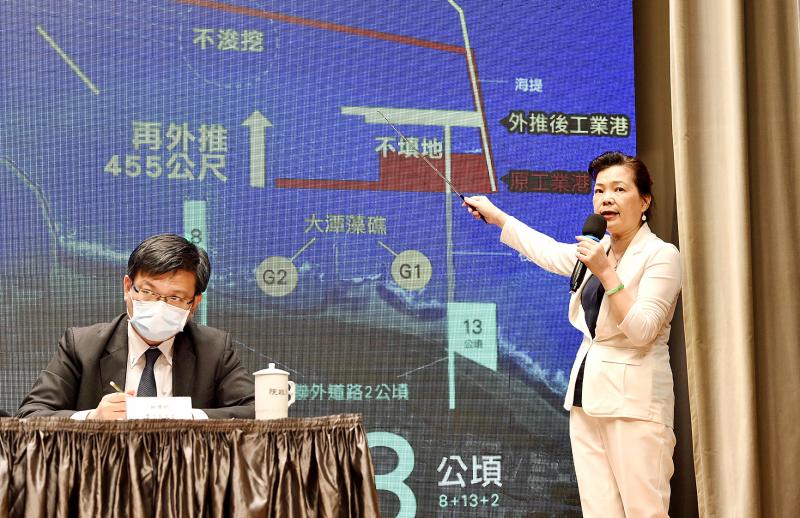The Ministry of Economic Affairs yesterday announced that it would move a proposed liquefied natural gas (LNG) project off Taoyuan farther from shore to “minimize any impact on algal reefs.”
In an effort to prevent the project from being blocked by a referendum, the ministry said that it had updated its proposal for the nation’s third LNG receiving terminal to move it another 455m from shore.
“By pushing the project farther out into deeper water, we no longer need to dredge the ocean floor,” Minister of Economic Affairs Wang Mei-hua (王美花) told a news conference at the Executive Yuan in Taipei. “The algal reefs will no longer be affected.”

Photo: Peter Lo, Taipei Times
Although the new proposal would add NT$15 billion (US$536.11 million) to the project’s budget, the terminal could still be completed in two-and-a-half years, Wang said.
Environmentalists have said that the terminal — to be built in the Guantang Industrial Park (觀塘工業區) on the coast of Datan Borough (大潭) in Taoyuan’s Guanyin District (觀音) — would damage algal reefs in the area. They have successfully petitioned for a referendum to block the terminal, which the ministry says is essential for the government’s plans to transition away from coal.
Speaking at a separate ministry news conference later yesterday, Deputy Minister of Economic Affairs Tseng Wen-sheng (曾文生) said that the nation’s efforts to burn less coal “would be put into reverse” if the referendum succeeds.
“We can finish the third LNG terminal in two-and-a-half years. Any alternative plan would take at least 11 years,” Tseng said.
There has been no update from the Rescue Datan’s Algal Reefs Alliance since the release of the new proposal.
Alliance convener Pan Chong-cheng (潘忠政) on Sunday wrote on Facebook that “there are still live reefs 1.5km from the shore.”
According to polls conducted by the DPP and quoted by the Chinese-language United Daily News, more than 50 percent of Taiwanese surveyed said they were against the project “if it means harming algal reefs.”
Support for a terminal farther away from shore received about 60 percent support.
Moving from burning coal to natural gas for electricity generation is a key part of President Tsai Ing-wen’s (蔡英文) energy transition plan. Last year, the proportion of electricity generated by natural gas was 40.8 percent. The government plans to increase it to 50 percent by 2025 to reduce the use of coal as the nation’s remaining nuclear power reactors are retired.
However, two existing LNG terminals are already operating at “overcapacity,” meaning that new LNG power plants slated to come online in 2025 would have “no gas to burn,” Tseng said.
“For the LNG generators coming online in 2024, we can perhaps increase liquefaction facilities at our existing terminals to meet their needs, but in 2025 there will be two big LNG generators coming online that will need gas from the new terminal,” he said.
Voters are to weigh in on the referendum on Aug. 28, along with three others. It would need the support of at least 25 percent of all eligible voters, and the number of yes votes must be more than the no votes.
If the referendum passed, the ministry would respect the people’s wishes, Tseng said.
“There is no doubt of that,” he added. “But it will be at a heavy cost to the environment, as we will have to keep burning more coal.”
LNG generators produce about half the amount of greenhouse gasses per unit of power generated, and far fewer pollutants harmful to human health.

Taiwan’s rapidly aging population is fueling a sharp increase in homes occupied solely by elderly people, a trend that is reshaping the nation’s housing market and social fabric, real-estate brokers said yesterday. About 850,000 residences were occupied by elderly people in the first quarter, including 655,000 that housed only one resident, the Ministry of the Interior said. The figures have nearly doubled from a decade earlier, Great Home Realty Co (大家房屋) said, as people aged 65 and older now make up 20.8 percent of the population. “The so-called silver tsunami represents more than just a demographic shift — it could fundamentally redefine the

Businesses across the global semiconductor supply chain are bracing themselves for disruptions from an escalating trade war, after China imposed curbs on rare earth mineral exports and the US responded with additional tariffs and restrictions on software sales to the Asian nation. China’s restrictions, the most targeted move yet to limit supplies of rare earth materials, represent the first major attempt by Beijing to exercise long-arm jurisdiction over foreign companies to target the semiconductor industry, threatening to stall the chips powering the artificial intelligence (AI) boom. They prompted US President Donald Trump on Friday to announce that he would impose an additional

China Airlines Ltd (CAL, 中華航空) said it expects peak season effects in the fourth quarter to continue to boost demand for passenger flights and cargo services, after reporting its second-highest-ever September sales on Monday. The carrier said it posted NT$15.88 billion (US$517 million) in consolidated sales last month, trailing only September last year’s NT$16.01 billion. Last month, CAL generated NT$8.77 billion from its passenger flights and NT$5.37 billion from cargo services, it said. In the first nine months of this year, the carrier posted NT$154.93 billion in cumulative sales, up 2.62 percent from a year earlier, marking the second-highest level for the January-September

Asian e-commerce giant Shein’s (希音) decision to set up shop in a historic Parisian department store has ruffled feathers in the fashion capital. Anger has been boiling since Shein announced last week that it would open its first permanent physical store next month at BHV Marais, an iconic building that has stood across from Paris City Hall since 1856. The move prompted some French brands to announce they would leave BHV Marais, but the department store had already been losing tenants over late payments. Aime cosmetics line cofounder Mathilde Lacombe, whose brand was among those that decided to leave following